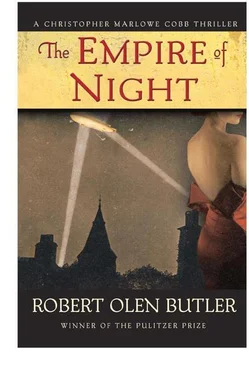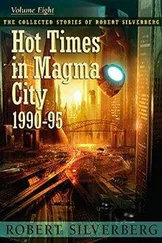This all came out in a rush, perhaps even a single breath. Yes, this woman yearned for enfranchisement beyond the vote.
I liked her.
“Yes,” I said.
“Good.”
She handed me an address on Brook Street, Number 24, just off Hanover Square, written out on a scrap of paper.
“Can you come at eight or thereabouts?” she said.
“Yes.”
She did what she’d worked herself up to do and she turned away, as if to stride off.
“One other thing,” I said.
She turned back to me.
“Should I know your name?”
Her eyes widened. “You don’t know my name?”
“I don’t.”
She humphed softly. Then she stuck out her hand once more. “Millicent Gibbs.”
I took it. She was putting all the muscle she could behind it. “Kit Cobb,” I said.
She looked hard into my eyes. “I like you, Kit Cobb,” she said. “And you like me. Just don’t patronize me.”
She let go of the shake, turned on her heel, and strode away.
I figured, in spite of her little lapses, she was doing pretty well with her project. She was right about what had been wrongly creeping into my attitude about her. I liked her even more for tweaking my nose for it.
I beat it back upstairs, finished my packing, and an hour later I’d moved into the Faulkner’s on Villiers Street, a modest, four-storey, brick-faced hotel on the Strand side of Charing Cross Station. Its street front split its space with Faulkner’s Hosier and Hatter. Just the sort of place for a minor journalist, and no doubt another discreetly government-friendly establishment.
I wouldn’t be here long. The tickets put me on the steamer tomorrow night from Folkestone to Vlissingen and then the train onward through neutral Holland to the German border and then to Berlin.
I went out at once and into the Strand and found a telegraph office. I wired Isabel Cobb at the Adlon of my presence at the Faulkner’s and my travel arrangements to Berlin. I was vague about my accommodations, saying I planned to stay at a Residenzpension , a boarding-house, common in the city.
In fact, Trask had put me into the Hotel Baden, a comparably modest hotel on Unter den Linden, near the Russian embassy and a five-minute walk from the Adlon. I didn’t want Stockman to know exactly where I was if I could avoid it.
I wrote at the end: Am eager to see your performance in Berlin. The play’s the thing.
A covert, needling little joke with my mother. As soon as the telegram was sent, however, I worried that I’d unwisely gotten caught up in whatever it was that always went on between my mother and me and, as a consequence, I’d endangered her. Stockman would surely be monitoring the telegrams to her through the Adlon.
I tried to talk myself out of the worry: he would understand the deutschfreundlich reporter’s reference to her performance as being about Hamlet, not an American spy; he’d understand the quote as referring to the play being the central feature of her visit to Berlin, not “the thing wherein I’ll catch the conscience the King,” the King being Lord Albert himself.
But I walked back to the hotel unsettled, eased only by the thought of an enfranchised Miss Gibbs.
The sun was just vanishing when my taxi slipped along the lilac hedges of Hanover Square and stopped before a flat-roofed, brick town house half the width but just as tall as my hotel. It was a private residence but without apparent servants and without a clear owner, at least on this Sunday night, the door being answered by one of the other women from my mother’s dressing room, the one wide enough to be the cellist in that string quartet of suffragettes. She recognized me at once and led me up a single flight to the parlor and I was introduced at the door as Mr. Christopher Cobb to a dozen or so of Millicent’s colleagues, about half of whom had also invited men. Most of these guys struck me as dandies, though I didn’t look at them very closely, simply registering among them more than one frock coat, apricot tie, waistcoat the color of the Hanover Square hedges in bloom. The women murmured at me sweetly. The men displayed indifference.
Millicent presented herself before me.
“I’m sorry I’m a little late,” I said.
“I remember using the phrase ‘or thereabout’ with the time,” she said.
“So you did.”
“I will feed you now,” she said.
And she led me to a table set for high tea and I grazed a bit. Between the cucumber sandwiches and the dandies in the room I felt as if I’d been cast in an Oscar Wilde play.
Which made me appreciate Millicent Gibbs all the more intensely. She and I drank a pretty good red wine off in the corner. The men kept their distance, and the suffragettes made solitary, hope-I’m-not-intruding pilgrimages over to us to chat briefly, mostly about how they felt nothing short of adoration for my mother.
When the air raid whistle blew in the street, the room upswelled in conversation and bustle like a theater crowd responding to the call to seats at the end of an intermission. “To the basement,” a woman’s voice cried out, and the group made for the parlor door.
I had no real interest in joining them and merely shifted my weight in our standing position, but Millicent’s hand went straight to my forearm to keep me where I was. She had her own plan.
When everyone was out of sight and clattering down the stairs toward the cellar, Millicent took my hand and we left the parlor and approached the staircase. But she and I climbed upward.
Two flights more, in darkness. By my count this was the top floor, but she led me around the banister and toward the back of the house and onto a narrower staircase leading up still farther.
She had not spoken a word. She had not let go of my hand. We reached a small vestibule and she released her hold on me and opened the door.
We stepped out onto the roof.
She closed the door behind us and stood beside me, our arms touching, and she said, “I’ve been longing to do this. Your mother is intrepid. I know you must be as well.”
The warden’s whistle was still piping somewhere along the street.
And now the six-pounders began to pop off in futility, out east.
I felt a shudder run through her. My first thought was that she was afraid.
But before I could raise my arm to put around her and before I let the obvious thing back into my head — she couldn’t be afraid because she’d deliberately brought us up here — she said, “Come this way,” and she took my hand again. The rush in her voice and the firmness of her hand both spoke not of fear but of some sort of dark exhilaration.
We neared the front parapet of the roof and she stopped us. “Here,” she said and she knelt, pulling at my hand, bringing me down beside her, and she let go of me and lunged forward. My knees were resting on a soft thing. I put a hand down. A blanket. My eyes were seeing enough now, adjusting in the dark. A searchlight flashed overhead and away. I could see Millicent there, stretched out on her back on the blanket, looking up into the sky.
“Please lie beside me,” she said.
I did, placing myself so our bodies touched from shoulder to foot. She did not ease away. Indeed, she gently pressed her shoulder and her hip a little closer. But I sensed this wasn’t about sex. Not at the moment, at least.
I was right.
“Do you think they will pass over us?” she said, and she slipped her hand into mine, our fingers intertwining, our bundled hands coming to rest upon our joined hips.
“Do you think they will drop a bomb on us?” I replied.
It was the cue for us to turn our faces and look at each other in the dark, on this open roof, beneath a London sky, on a Zeppelin night.
Читать дальше












